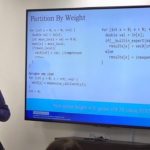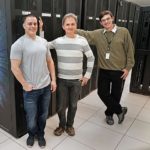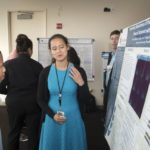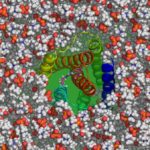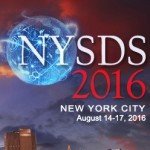“The goal of this hands-on workshop was to help participants optimize their application codes to exploit the different levels of parallelism and memory hierarchies in the Xeon Phi architecture,” said CSI computational scientist Meifeng Lin. “By the end of the hackathon, the participants had not only made their codes run more efficiently on Xeon Phi–based systems, but also learned about strategies that could be applied to other CPU-based systems to improve code performance.”
Reconstructing Nuclear Physics Experiments with Supercomputers
For the first time, scientists have used HPC to reconstruct the data collected by a nuclear physics experiment—an advance that could dramatically reduce the time it takes to make detailed data available for scientific discoveries. “By running multiple computing jobs simultaneously on the allotted supercomputing cores, the team transformed 4.73 petabytes of raw data into 2.45 petabytes of “physics-ready” data in a fraction of the time it would have taken using in-house high-throughput computing resources, even with a two-way transcontinental data journey.”
Bringing Diversity to Computational Science
“Computing is one of the least diverse science, technology, engineering, and mathematics (STEM) fields, with an under-representation of women and minorities, including African Americans and Hispanics. Leveraging this largely untapped talent pool will help address our nation’s growing demand for data scientists. Computational approaches for extracting insights from big data require the creativity, innovation, and collaboration of a diverse workforce.”
NYU Hosts Advanced Computing for Competitiveness Forum on April 13
The New York University Center for Urban Science and Progress will host the Advanced Computing for Competitiveness Forum on April 13. Sponsored by the U.S. Council on Competitiveness, the day-long event will look at why “To out-compete is to out-compute.” The Council’s landmark Advanced Computing Roundtable (ACR) – formerly the High Performance Computing (HPC) Initiative – is the preeminent forum for experts in advanced computing to set a national agenda on how such technologies should be leveraged for U.S. comptitiveness. Advanced computing includes technologies such as high performance computing, artificial intelligence (AI), and the Internet of Things (IoT). ACR members represent industrial and commercial advanced computing users, hardware and software vendors and directors of academic and national laboratory advanced computing centers.”
Bringing HPC Algorithms to Big Data Platforms
Nikolay Malitsky from Brookhaven National Laboratory presented this talk at the Spark Summit East conference. “This talk will present a MPI-based extension of the Spark platform developed in the context of light source facilities. The background and rationale of this extension are described in the paper “Bringing the HPC reconstruction algorithms to Big Data platforms.” which highlighted a gap between two modern driving forces of the scientific discovery process: HPC and Big Data technologies. As a result, it proposed to extend the Spark platform with inter-worker communication for supporting scientific-oriented parallel applications.”
Brookhaven Lab to Develop ECP Exascale Software
Scientists at Brookhaven National Laboratory will play major roles in two of the 15 fully funded application development proposals recently selected by the DOE’s Exascale Computing Project (ECP) in its first-round funding of $39.8 million. “The team at Brookhaven will develop algorithms, language environments, and application codes that will enable scientists to perform lattice quantum chromodynamics (QCD) calculations on next-generation supercomputers.”
Call for Papers: New York Scientific Data Summit
The New York Scientific Data Summit (NYSDS) has issued its Call for Papers. The event takes place August 14-17 in New York City.

